- About Ramapo
- Academics
- Admissions & Aid
- Student Life
- Athletics
- Alumni
- Arts & Community
- Quick Links
- Apply
- Visit
- Give
New Technologies, Antisemitism, and Holocaust Education
“New Technologies, Antisemitism, and Holocaust Education”
A five-part seminar series via Zoom
Artificial intelligence and other digital technologies promise to revolutionize our world. As we look forward to new possibilities, we remain mindful of potential dangers.
Looking beyond social media, we speak with industry leaders and scholars on the promises, opportunities, and challenges of new technologies to mitigate antisemitism and teach about the Holocaust. We also consider how these same technologies can be used in ways that are harmful to Jewish and other minority communities, and to the field of education.
All events will be held on Zoom.
Register in advance for free!
Luc Bernard: Gaming and the Holocaust
Monday, February 12 at 7:00 pm via Zoom
Luc Bernard designs popular video games. His most recent creation is A Light in the Darkness, which is available for free through Epic Games. The game tells the story of a working-class family of Polish Jews in France during the Holocaust, and is considered the first video game to portray the Holocaust accurately. A Light in the Darkness promotes empathy a path to historical understanding and has been played throughout the world. Bernard has also built a model Holocaust museum, Voices of the Forgotten, in the virtual universe of the popular Fortnite platform. Since then, he has been sought after to help prominent Holocaust museum expand their reach by moving into digital space.
Edwin Black, Artificial Intelligence (AI) and Antisemitism
Wednesday, March 6 at 7:00 pm via Zoom
Artificial Intelligence holds many untold promises for humanity. This lack of certainty has the potential both to excite and terrify. Edwin Black, noted historian and public speaker, will lead us in a discussion of AI’s potential to affect the spread and mitigation of antisemitism.
Countering AI Antisemitism in Theory and Practice
Sunday, March 10 at 11:00 am via Zoom
As a follow up to our discussion with Edwin Black, we will host Dr. Ildikó Barna (Eötvös Loránd University, Budapest) and Tal-Or Cohen Montemayor (CEO of Cyberwell, Israel) for a discussion of how to identify and combat antisemitism in a world increasingly influenced by Artificial Intelligence.
Accenture: Artificial Intelligence as a Tool for Holocaust Research
Tuesday, April 9 at 7:00 via Zoom
Click Here to Register in Advance
The Arolsen Archives preserve the world’s largest collection of documents on Nazi persecution — 110 million documents and digital objects, a portion of which are part of UNESCO’s Memory of the World program — to keep the memory of the crimes of the German terror regime alive. An essential part of the Archives’ work is to make these documents accessible to all who wish to search for traces of Holocaust victims and survivors, persecution of minorities and forced labor. Every document maintained in the archives needs to be reviewed and its information (e.g., the family name and birth date on a prisoner registration form) put into a database.
To facilitate this process, the Arolsen Archives established “#everynamecounts,” a crowdsourcing project for volunteers to extract information from documents manually. Ian Lever, an Accenture volunteer and a member of the company’s Jewish Employee Resource Group, quickly realized that AI could accelerate this process significantly. Within 10 weeks, he and other Accenture volunteers set up an AI solution to index the documents. Because the AI captures the information faster and increases its accuracy, four volunteers can now validate approximately 160 documents in one hour, a 40-fold increase in productivity.
Waitman Wade Beorn: Virtually Modeling the Janowska Concentration Camp
Tuesday, May 7 at 7:00 pm via Zoom
The Nazis established the Janowska Concentration Camp on the outskirts of occupied Lviv (currently in Ukraine, also called Lvov and Lemberk). They enslaved and murdered no fewer than 80,000 Jews on that site. Like other camps, much of the former site remains inaccessible or was destroyed by the Nazis during the war to cover their crimes. Dr. Waitman Wade Beorn, an historian of the Second World War, has endeavored to create a virtual model of the camp for research and teaching, based upon archival and photographic evidence, as well as survivor testimonies.
Copyright ©2025 Ramapo College Of New Jersey. Statements And Policies. Contact Webmaster.
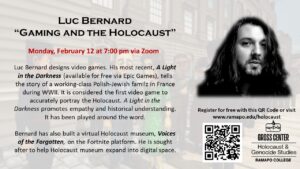
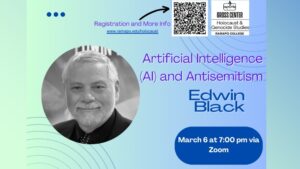
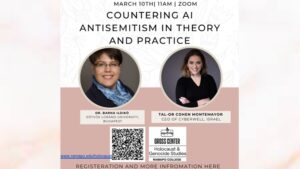
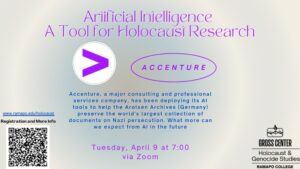
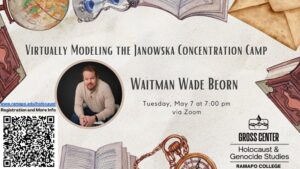

Follow Us!